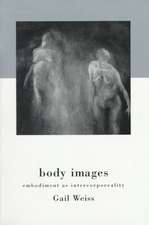The Origins of Music
Autor Carl Stumpf Traducere de David Trippetten Limba Engleză Hardback – 26 iul 2012
Preț: 446.08 lei
Preț vechi: 547.08 lei
-18% Nou
Puncte Express: 669
Preț estimativ în valută:
85.38€ • 92.78$ • 71.77£
85.38€ • 92.78$ • 71.77£
Carte tipărită la comandă
Livrare economică 09-15 aprilie
Preluare comenzi: 021 569.72.76
Specificații
ISBN-13: 9780199695737
ISBN-10: 0199695733
Pagini: 282
Dimensiuni: 164 x 241 x 22 mm
Greutate: 0.64 kg
Editura: Oxford University Press
Colecția OUP Oxford
Locul publicării:Oxford, United Kingdom
ISBN-10: 0199695733
Pagini: 282
Dimensiuni: 164 x 241 x 22 mm
Greutate: 0.64 kg
Editura: Oxford University Press
Colecția OUP Oxford
Locul publicării:Oxford, United Kingdom
Recenzii
Trippett's translation has brilliantly made use of the internet ... to make many of the recordings Stumpf references in this work available online ... Should David Trippett have only translated The Origins of Music, it would have yet been an invaluable contribution to the field. However, as editor and translator, he goes above and beyond by providing two essays prior to the book, and a new translation of Stumpf's autobiography ... These materials provide a valuable frame for The Origins of Music by supplying a helpful context within which to consider Stumpf's contributions. ... the translationofStumpf's The Origins of Music is a timely and valuable addition to our scholarly literature. ... ESCOM has done the field of music cognition a wonderful service in funding a new trans- lation of an important early work.
Trippett's book transcends the role of a simple translation. This volume not only includes the first English translation of Stumpf's Origins it also includes informative notes by the editor, sound file examples, the inclusion of Stumpf's autobiographical A Self Portrait (1924), an extensive bibliography of Stumpf's publications, as well as two introductory essays. The book is a valuable resource for researchers and scholars studying Stumpf or the history of psychology, cognitive science, music psychology, ethnomusicology and musicology. One of the most valuable aspects of this volume is something not included as part of the 1911 publication of Origins of Music. Trippett includes a collection of sound files for 20 of the 67 musical examples found in Part II...These...are a goldmine. They allow us to hear what Stumpf describes and they bring us an objective piece of different musical cultures from the turn of the twentieth century.
The translation under review represents a project richly worthy of Stumpf's contributions to the sciences of music, surely among them, ethnomusicology. David Trippett's translation effectively remains true to the German formulations, while producing a text that contemporary readers will find very readable (and at times quite delightful). The introductory essays, especially the one by Trippett, are very helpful. The inclusion of Stumpf's 1924 self-portrait ... brilliantly draws the reader closer to the author and his world. The Origins of Music published in this modern edition, would enrich any course in music history, music theory, cognitive musicology, and ethnomusicology.
This is a new translation, from German into English, of Carl Stumpf's work The Origins of Music from 1911... Although the book is now 100 years old, it is enjoyable to read. The argument is logical and well-founded, and the text seems in many ways very modern... What fascinates most is that the book shows how one man's painstaking study of "The psychology of tone" and "The origins of music" formed the basis for two completely new fields of research: experimental psychology and ethnomusicology.
Trippett's book transcends the role of a simple translation. This volume not only includes the first English translation of Stumpf's Origins it also includes informative notes by the editor, sound file examples, the inclusion of Stumpf's autobiographical A Self Portrait (1924), an extensive bibliography of Stumpf's publications, as well as two introductory essays. The book is a valuable resource for researchers and scholars studying Stumpf or the history of psychology, cognitive science, music psychology, ethnomusicology and musicology. One of the most valuable aspects of this volume is something not included as part of the 1911 publication of Origins of Music. Trippett includes a collection of sound files for 20 of the 67 musical examples found in Part II...These...are a goldmine. They allow us to hear what Stumpf describes and they bring us an objective piece of different musical cultures from the turn of the twentieth century.
The translation under review represents a project richly worthy of Stumpf's contributions to the sciences of music, surely among them, ethnomusicology. David Trippett's translation effectively remains true to the German formulations, while producing a text that contemporary readers will find very readable (and at times quite delightful). The introductory essays, especially the one by Trippett, are very helpful. The inclusion of Stumpf's 1924 self-portrait ... brilliantly draws the reader closer to the author and his world. The Origins of Music published in this modern edition, would enrich any course in music history, music theory, cognitive musicology, and ethnomusicology.
This is a new translation, from German into English, of Carl Stumpf's work The Origins of Music from 1911... Although the book is now 100 years old, it is enjoyable to read. The argument is logical and well-founded, and the text seems in many ways very modern... What fascinates most is that the book shows how one man's painstaking study of "The psychology of tone" and "The origins of music" formed the basis for two completely new fields of research: experimental psychology and ethnomusicology.
















